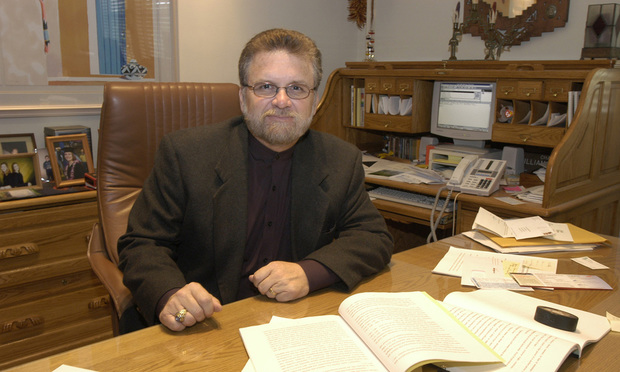Bedsworth: Artificial Intelligence Meets Natural Ignorance
I know nothing about Artificial Intelligence. Nothing. Nada. Zip, zilch, bupkis. The "A." might as well stand for "Alien."
January 09, 2020 at 09:00 AM
7 minute read
 Justice William Bedsworth, California Court of Appeal for the Fourth District
Justice William Bedsworth, California Court of Appeal for the Fourth District
Practice tip for young lawyers: Judges are old.
No, we're not all old. I became a judge at 39, so I'm well aware that there's been time to enrobe a generation or two of younger judges since then who are not yet old. But even the "younger" judges are mostly older than your parental units.[1]
There are a lot of pre-SLAPP, pre-CEQA, pre-Family Code[2] judges out there and you have to take that into account. You aren't writing your brief for your classmates. You're writing it for "some old guy"[3] whose idea of cutting-edge technology is PowerPoint and Super Mario 64.
That means your briefing and your arguments have to find a way to explain technology without being condescending. That is a skill I didn't have to learn, and it's a valuable one. It requires more than just an occasional, "With all due respect, Your Honor … ."[4]
Let me try to explain what you're up against here. My Christmas present from the UCI School of Law this year was a book whose cover is dominated by the letters A. I. I assume every member of the UCI Law Board of Visitors got one of these, but it may be just that they figured my natural intelligence was more in need of supplementation than the others and sent me a different book.
Either way, it illustrates my point rather well. I know nothing about Artificial Intelligence. Nothing. Nada. Zip, zilch, bupkis. The "A." might as well stand for "Alien."
But if you're a contemporary of the Family Code, I'm betting you not only know a good deal about it, you know why they sent me the book. And you may be horrified by my acknowledgment of Stygian ignorance in this regard.
Now … contrary to what my critics have averred, I can read. By the time you read this, I will have read my book about the "A. I. Revolution," and when Dean Richardson asks me what I thought about Surinder Oberoi's ideas or the problem of algorithmic Jim Crow, I will be able to answer without sounding like I'm having a stroke.
But the other bench officers of our county don't have to worry about answering to a dean. While I'm reading up on A. I., they're going to be reading briefs and advance sheets and cases from 1969 that are still good law, just as I would have been doing had the Creature from the Black Lagoon of UCI not shown up on my doorstep in wrapping paper and a bow.
Here's another example of the learning curve you all face. Every morning, my wife and I read the paper together. Kelly's a voracious reader with catholic[5] interests. I have days when I learn more at the breakfast table than I do in chambers.
Kelly reads the Times because it's the Los Angeles For Crying Out Loud Times. We both grew up with it and it's a great newspaper.
I read the Register because I live in Orange County. When I develop an interest in the Simi Valley and the Los Angeles City Council, I'll go back to reading the Times. Until then, it's like someone in San Francisco reading the Portland Tribune.
We both read the newspaper in print. My three children all read digital news. I assume many of you do.
Lord knows, I hope you're reading digital news, because if print journalism's problems are a true reflection of how informed our citizenry is, we're firmly ensconced in the proverbial handbasket and just waiting for the earth to open up beneath us.
So Kelly reads me a headline from the Times. "Commission approves 8 toadpools at Crystal Cove State Park."
And I laugh.
"Why is that funny," she asks.
"Because when you read it, I thought you said TOADpools, rather than tidepools."
"I did say that"
"What?"
"Toadpools. The Coastal Commission has approved development of eight pools to provide seasonal homes for toads at Crystal Cove State Park."
"Toadpools? Like Jeremiah in the Hoyt Axton song? And like Kermit … and Michigan J. Frog … and TCU horned frogs and like that? Those kind of toads."
"No, not those kind of toads because none of those are toads. They're frogs and … and … I don't know, whatever a horned frog is … a lizard? No these are pools for toads."
"Toad pools."
"Yes."
"Not tidepools."
"No."
Once again, the abyss that is my understanding of modern life—an abyss I generally cover with a 19th century tarp of vocabulary, mental agility, and literary reference—was exposed. It was all I could do to keep from falling in.
Fortunately, I was able to call upon aforesaid vocabulary, mental agility, and literary reference in time for a witty response: "Dang," I said.
Turns out "The Commission approved a coastal development permit application submitted by the state Department of Parks and Recreation for the artificial pools along the southeastern boundary of Crystal Cove State Park and additional habitat restoration on about 10½ adjacent acres to foster breeding, foraging, and nesting opportunities for the western spadefoot toad and the cactus wren, a small bird."
I have no idea whether this is a good idea or a bad idea. An hour ago you could have told me the spadefoot toad was a pest we needed to eradicate, and I probably would have nodded absently and agreed. Apparently I underestimated the spadefoot.
But it has been my experience that everything the Coastal Commission does pisses off somebody.[6] And if this has that effect, it's liable to come before me, so I can't say much about it.
But this is the sole advantage of being old and out of touch: it's hard to form preconceptions when you don't know the first thing about a subject.[7] Should the toad pools come before me, I will have a completely open—indeed, one might say vacant—mind.
This is good for me because CEQA cases are a trainwreck in a blizzard. They are so deuced hard that you need to have lots of unused gray matter available in order to solve them.
Those of you who thought my unused gray matter was a drawback can now see that I have been wise to reserve those areas and hold them out of cultivation. Now when toadpools and A. I. cases come before me, I'll have room in my head for them.
The rest of you—especially you young lawyers—can set about trying to fill that space.
Good luck.
Beds Notes:
[1] I'll pause here so you can clear your mind of the word "fossil."
[2] Enacted 1992, folks. Just because the annotations make it eight volumes long doesn't make it old. It showed up at the same time as A Few Good Men, The Bodyguard, and Wayne's World. If you're part of the target audience for this column, you're a contemporary of the Family Code.
[3] The g-word, "gal" is no longer usable, so "guy" must now be unisex. Like "actor."
[4] If you say that to Justice Fybel, you'd better be wearing Kevlar.
[5] Small "c." Synonyms: wide-ranging, universal.
[6] I figure now that this phrase has been used in Congress, I can say it in informal writing. I think it particularly apropos here.
[7] At least it is for me. My reading of newspapers indicates to me that others do not see this as an obstacle.
William W. Bedsworth is an associate justice of the California Court of Appeal. He writes this column to get it out of his system. He can be contacted at [email protected]. And look for his latest book, "Lawyers, Gubs, and Monkeys," through Amazon, Barnes and Noble and Vandeplas Publishing.
This content has been archived. It is available through our partners, LexisNexis® and Bloomberg Law.
To view this content, please continue to their sites.
Not a Lexis Subscriber?
Subscribe Now
Not a Bloomberg Law Subscriber?
Subscribe Now
NOT FOR REPRINT
© 2025 ALM Global, LLC, All Rights Reserved. Request academic re-use from www.copyright.com. All other uses, submit a request to [email protected]. For more information visit Asset & Logo Licensing.
You Might Like
View All

Fresh lawsuit hits Oregon city at the heart of Supreme Court ruling on homeless encampments
4 minute read

Trending Stories
- 1Uber Files RICO Suit Against Plaintiff-Side Firms Alleging Fraudulent Injury Claims
- 2The Law Firm Disrupted: Scrutinizing the Elephant More Than the Mouse
- 3Inherent Diminished Value Damages Unavailable to 3rd-Party Claimants, Court Says
- 4Pa. Defense Firm Sued by Client Over Ex-Eagles Player's $43.5M Med Mal Win
- 5Losses Mount at Morris Manning, but Departing Ex-Chair Stays Bullish About His Old Firm's Future
Who Got The Work
J. Brugh Lower of Gibbons has entered an appearance for industrial equipment supplier Devco Corporation in a pending trademark infringement lawsuit. The suit, accusing the defendant of selling knock-off Graco products, was filed Dec. 18 in New Jersey District Court by Rivkin Radler on behalf of Graco Inc. and Graco Minnesota. The case, assigned to U.S. District Judge Zahid N. Quraishi, is 3:24-cv-11294, Graco Inc. et al v. Devco Corporation.
Who Got The Work
Rebecca Maller-Stein and Kent A. Yalowitz of Arnold & Porter Kaye Scholer have entered their appearances for Hanaco Venture Capital and its executives, Lior Prosor and David Frankel, in a pending securities lawsuit. The action, filed on Dec. 24 in New York Southern District Court by Zell, Aron & Co. on behalf of Goldeneye Advisors, accuses the defendants of negligently and fraudulently managing the plaintiff's $1 million investment. The case, assigned to U.S. District Judge Vernon S. Broderick, is 1:24-cv-09918, Goldeneye Advisors, LLC v. Hanaco Venture Capital, Ltd. et al.
Who Got The Work
Attorneys from A&O Shearman has stepped in as defense counsel for Toronto-Dominion Bank and other defendants in a pending securities class action. The suit, filed Dec. 11 in New York Southern District Court by Bleichmar Fonti & Auld, accuses the defendants of concealing the bank's 'pervasive' deficiencies in regards to its compliance with the Bank Secrecy Act and the quality of its anti-money laundering controls. The case, assigned to U.S. District Judge Arun Subramanian, is 1:24-cv-09445, Gonzalez v. The Toronto-Dominion Bank et al.
Who Got The Work
Crown Castle International, a Pennsylvania company providing shared communications infrastructure, has turned to Luke D. Wolf of Gordon Rees Scully Mansukhani to fend off a pending breach-of-contract lawsuit. The court action, filed Nov. 25 in Michigan Eastern District Court by Hooper Hathaway PC on behalf of The Town Residences LLC, accuses Crown Castle of failing to transfer approximately $30,000 in utility payments from T-Mobile in breach of a roof-top lease and assignment agreement. The case, assigned to U.S. District Judge Susan K. Declercq, is 2:24-cv-13131, The Town Residences LLC v. T-Mobile US, Inc. et al.
Who Got The Work
Wilfred P. Coronato and Daniel M. Schwartz of McCarter & English have stepped in as defense counsel to Electrolux Home Products Inc. in a pending product liability lawsuit. The court action, filed Nov. 26 in New York Eastern District Court by Poulos Lopiccolo PC and Nagel Rice LLP on behalf of David Stern, alleges that the defendant's refrigerators’ drawers and shelving repeatedly break and fall apart within months after purchase. The case, assigned to U.S. District Judge Joan M. Azrack, is 2:24-cv-08204, Stern v. Electrolux Home Products, Inc.
Featured Firms
Law Offices of Gary Martin Hays & Associates, P.C.
(470) 294-1674
Law Offices of Mark E. Salomone
(857) 444-6468
Smith & Hassler
(713) 739-1250






